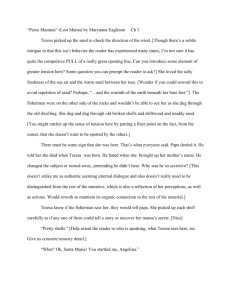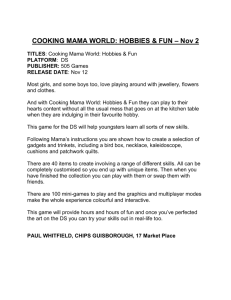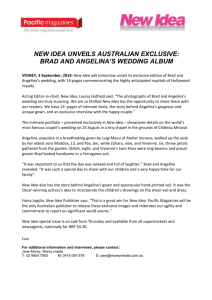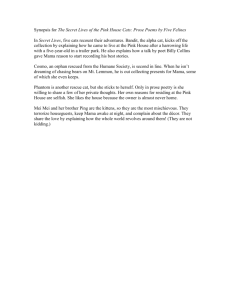Purple Shadows Angelina could see him coming up the road. He
advertisement
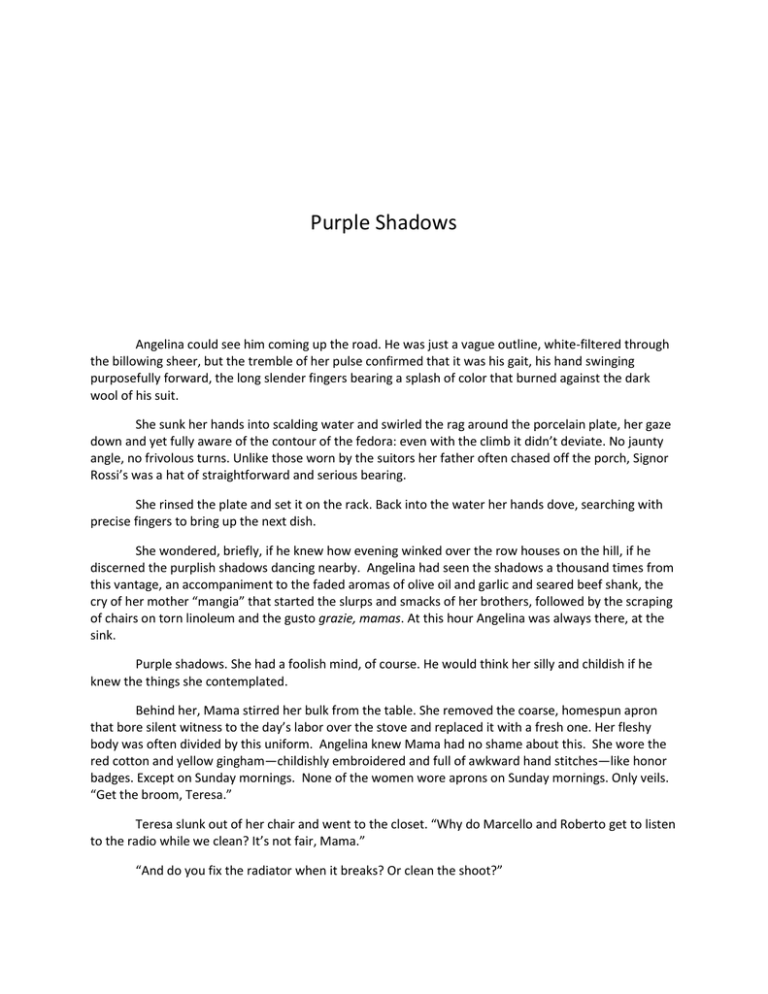
Purple Shadows Angelina could see him coming up the road. He was just a vague outline, white-filtered through the billowing sheer, but the tremble of her pulse confirmed that it was his gait, his hand swinging purposefully forward, the long slender fingers bearing a splash of color that burned against the dark wool of his suit. She sunk her hands into scalding water and swirled the rag around the porcelain plate, her gaze down and yet fully aware of the contour of the fedora: even with the climb it didn’t deviate. No jaunty angle, no frivolous turns. Unlike those worn by the suitors her father often chased off the porch, Signor Rossi’s was a hat of straightforward and serious bearing. She rinsed the plate and set it on the rack. Back into the water her hands dove, searching with precise fingers to bring up the next dish. She wondered, briefly, if he knew how evening winked over the row houses on the hill, if he discerned the purplish shadows dancing nearby. Angelina had seen the shadows a thousand times from this vantage, an accompaniment to the faded aromas of olive oil and garlic and seared beef shank, the cry of her mother “mangia” that started the slurps and smacks of her brothers, followed by the scraping of chairs on torn linoleum and the gusto grazie, mamas. At this hour Angelina was always there, at the sink. Purple shadows. She had a foolish mind, of course. He would think her silly and childish if he knew the things she contemplated. Behind her, Mama stirred her bulk from the table. She removed the coarse, homespun apron that bore silent witness to the day’s labor over the stove and replaced it with a fresh one. Her fleshy body was often divided by this uniform. Angelina knew Mama had no shame about this. She wore the red cotton and yellow gingham—childishly embroidered and full of awkward hand stitches—like honor badges. Except on Sunday mornings. None of the women wore aprons on Sunday mornings. Only veils. “Get the broom, Teresa.” Teresa slunk out of her chair and went to the closet. “Why do Marcello and Roberto get to listen to the radio while we clean? It’s not fair, Mama.” “And do you fix the radiator when it breaks? Or clean the shoot?” “They don’t do that, Mama.” Teresa scraped the bristles over the floor in dramatic movements. “Papa does everything. They’re spoilt.” “Spoilt? You are spoilt. Marcello and Roberto pay the rent when they have work.” “They gamble most of it away, Mama.” “Teresa! “ “Well, it’s true, isn’t it Angelina?” With an elbow she jabbed her sister. “Oh, you won’t tell. You’re too good, too quiet. You never get mad at anybody, do you Angelina?” “Angelina is a good girl, Teresa, you should take a lesson from her.” The fedora was half-way up the hill, passing the Montoro’s lopsided fence with its ruby-red crown—tenacious roses. The blooms received scant attention from him. Angelina could see the long fingers carried a small box. An incongruous gold bow paraded from its lid. “I’m not so good,” she said. “Then tell Mama they bet on dogs and chickens!” “What do you know of dogs and chickens?” Mama waved a hand in the air, close enough to Teresa’s face to make her dart away, broom extended. “Where have you been that you know of such things?’ “Nowhere, Mama. To mass, to the social club at St. Rita’s, to Cavillie’s for a soda. That is the extent of my life.” “Is this true, Angelina? Is this all she does? I’m going to tell your Papa. You’ve been out with Rafael again, and that Santorini girl. She is very fast. She’s going to get in trouble, and you along with her.” From the parlor the muffled voices of the radio drifted in, Vaudevillian punch lines delivered crisply, followed by the loud guffaws of her father and brothers. They would be sprawled over the faded sofas, bellies content, feet aloft. Outside, wayward sunlight caught the shiny wheels of Mrs. Bartelli’s pram as she maneuvered it down the driveway, her heels digging in to keep the cargo from slipping away. Signor Rossini bowed stiffly as he encountered her and doffed his hat. The silk band shimmered like quicksilver. There and gone as the hat was returned, the route resumed. Angelina felt a fine sheen of perspiration break out on her forehead. “Well, Angelina, is it true?” “Rafael is not a bad man, Mama.” “There, you see,” declared Teresa. “Angelina knows.” She put an arm loosely around her shoulders. “You are a good sister. Oh, it seems Maria Bartelli goes for a walk, Mama.” “Take a lesson from Mrs. Bartelli! It’s easy to go down the hill, Teresa, but very hard to come back up again.” “Aye, Mama!” Teresa dropped her head on Angelina’s shoulder for an instant, then shot to full attention. “And who is that man?” She sucked in her breath. “Why, Mama, it’s Signor Rossini.” “Cosa? In this neighborhood?” Mama commandeered the window frame. “Gesu Maria…Get your papa.” Angelina had already abandoned the sink and stood drying her hands on the dish cloth. Her fingers felt chapped and worn, it was just a matter of time until they were like her mother’s, permanently red. Her apron came off and she posted it on the hook. The fedora was in full view now, bowed down as its owner opened the gate and came up the walk. “Go and fix yourself up, Angelina,” her mother urged in a frantic whisper. “Brush your hair, clean your teeth.” “Mama—“ “Change your blouse. There is sauce. Svelto! Svelto!” “Mama, please, I don’t wish—“ Mama’s rough-skinned finger seared her lips. “You have no wishes, Angelina. Once, perhaps, when I first came to this country, I thought …but not now, not anymore. You must think of the bread lines, Angelina. The bread lines.” Angelina could feel her fingers curl until her nails dug into her palms. “Capisci, Angelina?” “Capisci, Mama.” She had barely escaped up the narrow staircase when the confusion broke out below. Voices and exclamations, scurrying feet. She climbed past the landing, her feet tapping a rapid rhythm, then passed her own bedroom with its neat coverlet and orderly dressing table. At the end of the narrow hall she paused. The rope hung silent and still. She grabbed it and pulled with all her might. With a reluctant groan the hidden staircase tumbled open. She scampered up and disappeared into the semi-darkness of the attic. She was out of her senses, of course. They would be waiting. They would be angry. She was no longer a child—to run away. But her heart beat a fluttery rhythm now, her breath quivered in her chest. Somewhere inside the attic sat the relics of her childhood: abandoned dolls and playthings. She didn’t know where they were. She could not see them in the gathering dusk. The only thing that stood out was the ancient steamer trunk that had come over from the old country. Still bearing scuffs and marks and stamps… Napoli. A sound escaped her, like a sob squeezed from her lungs. It was no use. No use. The attic’s small dormer window framed the neighborhood: the smattering of new light, quaint and predictable, expecting night with a comfortable defense. Meanwhile the horizon churned, a dark rainbow. She threw open the sash and leaned over the sill. From here she could see the river, immense and mighty, pulling her over the rooftops, drawing her out of this current and into its own, westward somewhere, surely, toward the purple shadows and rising moon. “Angelina!” Mama’s hiss shot up the stairs. She whirled, pulse quailing. If she lingered, she would let them all down, disappoint them. Possibly lose them to the bread lines. Papa’s job was intermittent. Work some days, other days she knew he shuffled off and stood on a street corner. But Signore Rossi was well established. He was a machinist. His income was steady. She might, in time, save the entire family. She looked back at the moon. It was so narrow and thin and pale. Just a tiny sliver, low on the horizon. Had anyone noticed it, lying on its back? Once, Sister Micheala announced the moon lacked its own brilliance, that it was only reflected light. That it was in fact, dead. But Angelina thought, to reflect light in a dark place…Tonight, the moon seemed content with its job. It looked rather gay, in fact, lying there. For an instant, she thought: would Signore Rossi see the moon? Would he know the purple shadows? She fled down the stairs, her mother clicking and scolding. The stairs were shoved back into place while Angelina raced to her room and tore off her blouse. Her slim reflection shot past the mirror as she produced fresh clothing, buttoned herself up and ran a comb through her hair. A tiny dab of rose water at her wrists. In a whir of motion she escaped her mother’s swinging palm and tumbled down the stairs. She was on the sofa, hands folded, next to Teresa, Mama on the other side. The men were on the porch, voices low, intense. Suddenly Papa appeared in the doorway. Angelina’s breath caught in her throat. His face was drained of all color. He looked so old suddenly. He spread his hands, then curled them into fists. “ I should throw him out,” he whispered raggedly. It was like he had seen something he’d never seen before, and it baffled him. Mama rose to her feet, using a heave from the sofa arm. “Roberto, what is it?” Papa looked at her helplessly. A dry mirthless laugh sounded in his throat.”He wants Teresa.” Silence slunk into the room. There was no movement. Except for Mama’s mouth which fell open. Her bewildered stare enveloped Papa. Papa’s gaze fixed itself on her in return; two questions battling for answer. Teresa broke the stunned silence with a chortle. “Me?” she cried. “Signore Rossi wants me??” “Shut your mouth, child,” Mama scolded. “What could he be thinking?” “I’m going to throw him out!” Mama composed herself, placed soothing palms on Papa’s shoulders. “No, no, Roberto. Listen to me. What is it? Why?” “Because.” Papa seemed at a loss. “Because he says….” “What? What does he say?” “That Teresa can…bear him children.” The silence grew larger. Angelina felt herself melt into the sofa. She knew what Signore Rossi had meant. She was no fool. Mama threw her hands forward, waving them in the air. “Angelina can bear children.” Papa shrugged heavily. “She is…thinner. He asks for Teresa.” “Imagine that,” Teresa said. She spoke with an amused undertone, but Teresa didn’t understand. He would kill her, Angelina thought. Kill her. In six months the life would be gone from her sister. “What did you say to him? What did you say, Roberto?” “That he can’t have her of course.” “Good!” “The second daughter doesn’t leave until the first one is married! He takes Angelina, or no Montoro whatsoever!’ “Good! And what did he say?” “He’s on the porch…He’s still on the porch.” “He’s waiting for you, Angelina…” It would have been nice, she thought. It would have been so nice. If he could see the purple shadows. But it didn’t matter. Nothing like that mattered at all. Only the bread lines.
